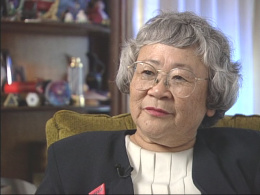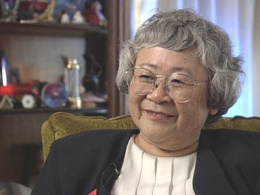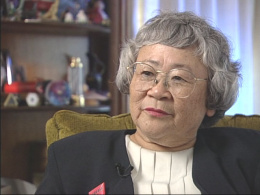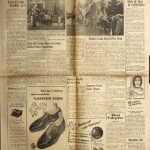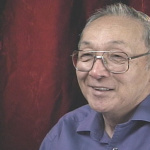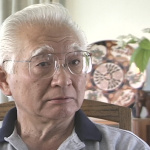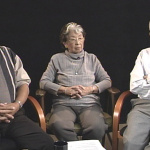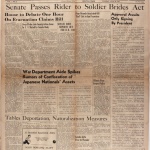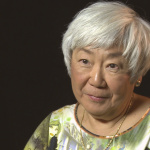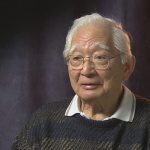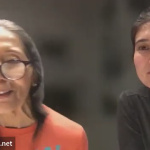Aki Kurose
| Name | Akiko Kurose |
|---|---|
| Born | February 11 1925 |
| Died | May 24 1998 |
| Birth Location | Seattle, WA |
| Generational Identifier |
Seattle teacher and tireless peace and social justice activist Aki Kurose spent her life advocating on behalf of the neglected, the disadvantaged, and children. She helped establish Seattle's Head Start program, crusaded for non-discriminatory affordable housing, and won numerous awards for her innovative work as an elementary school teacher. A Nisei , Kurose's life's course was altered when she, along with her parents and three siblings, was imprisoned in a World War II U.S. government prison camp. During and after the war, at a Quaker university in Kansas, she adopted a lifelong belief in the Quaker values of peace and nonviolent conflict resolution, which became the foundation for the rest of her life's varied work.
Early Life and War Years
Born Akiko Kato in Seattle on February 11, 1925, to Issei parents Harutoshi Kato of Miyagi Prefecture, and Murako (née Okamoto) Kato, from Kumamoto Prefecture, her parents met in Berkeley, CA, and settled in Seattle, where Kato's mother ran an apartment house and her father worked as a porter at Union Station. Later, Kurose credited her pacifist-minded, racially tolerant parents and her highly diverse working-class Seattle neighborhood for making her a non-traditional Nisei woman. Her parents were not bound by traditional gender roles: her mother ran the boiler room of their building and her father made jelly rolls every Friday evening to welcome visiting Jewish, Chinese and African American neighbors. A self-described "joiner," Kurose was active in the Girl Scouts as well as her high school band and drama club. Neither sophisticated or political, she was unprepared for the shock of discrimination and imprisonment, and later said of those prewar years, "I hadn't a clue." [1]
Kurose's happy teen life was shattered her senior year of high school with the bombing of Pearl Harbor on December 7, 1941. Though she believed she and her siblings would, as American citizens, be immune from reprisal, she realized she was wrong when a school teacher told her, "You people bombed Pearl Harbor." It was then, said Kurose, that she became aware of her "Japaneseness," and began to feel "threatened and nervous." [2] First forcibly removed to the Puyallup , Washington fairgrounds, her family was assigned to one room in a barrack on the converted parking lot, while others lived in converted horse stalls and pig pens. "People would drive around in cars, calling us names. You'd feel like an animal in the zoo," she recalled. [3] She completed her last year of high school at Minidoka concentration camp in Idaho, then was given leave to attend Friends University, a Quaker College in Wichita, Kansas.
Postwar Years
After graduating from college, Kurose in 1948 married Junelow (Junks) Kurose, recently discharged from the U.S. Army and her best friend's brother. They relocated to Chicago, returning to Seattle in 1950. There, Kurose worked as secretary for a porter's union that her father had helped organized to ease tensions between African American and Japanese porters.
Kurose also became active with the Congress of Racial Equality (CORE), which was engaged in direct-action campaigns for black employment and fair housing, among other issues. [4] When she and her husband found that there were barriers to finding housing because of discriminatory practices by realtors and other groups, she became active in the "open housing" movement through the American Friends Service Committee (AFSC), which sought to remove such barriers. In 1999, the Low-Income Housing Institute honored Kurose's work by naming an affordable housing development in North Seattle, Aki Kurose Village.
Also active in the Women's International League for Peace and Freedom and the activist branches of the YWCA, Kurose enrolled her six children in the Freedom School, the Seattle version of a series of schools first established in Mississippi in 1964. There, they learned about civil rights and race relations, lessons that were augmented by accompanying their mother to civil rights marches and antiwar demonstrations. It was while her children were still young that Kurose became interested in early childhood education. She was part of a group that started Seattle's first Head Start in the mid-sixties, and began teaching in the 1970s. In 1981, when she was 56, received her master's degree in early childhood education, and continued to take courses in various subjects for the rest of her life. She described her job as "teaching math, science and peace," to first graders, telling them, 'If you're not at peace with yourself, with your neighbor, with your community, you can't really learn very much. We have to get rid of all this garbage, this angry, competitive feeling. Then we'll all get along." [5]
Kurose's entry into teaching coincided with the highly contentious school desegregation efforts that played out in Seattle in the mid-1970s, and resulted in her transfer from an urban, predominantly African American school to an affluent, once exclusively white suburban school. At first the entire parent body was against Kurose's arrival. One parent told her, "Well, if you want to bring your chopsticks and rice bowl, it's okay." [6] Instead of reacting with anger or defensiveness, she took their doubts and suspicions in stride, allowing two parents to sit in on her class every day for a month. Kurose gradually won the respect and admiration of both students and parents. She was named Seattle Teacher of the Year in 1985 and awarded the Presidential Award for Excellence in Science and Mathematics in 1990. For the awards ceremony in Washington, D.C., Kurose borrowed a dress and festooned it with peace buttons, daily accessories for her. In 1980, Kurose was appointed to Jimmy Carter's National Advisory Council on the Education of Disadvantaged Children, and in 1992 she was awarded the United Nations Human Rights Award.
As a teacher, Kurose refused to give grades, instead stressing cooperative work. She prized experiential learning over rote memorization, taking her class to a fish hatchery and having them bring back salmon eggs to tend to in the classroom's refrigerated aquarium as they learned about the fish's life cycle. When the salmon reached fingerling size, Kurose had her student release them back into freshwater streams as they sang, "Bon Voyage, Bon Voyage." [7]
In 2000, a middle school in a multicultural community was renamed in honor of Kurose and the name of an early and influential school board member was removed, to the objection of some. Editorializing on how to honor both figures, The Seattle Times noted that Kurose "touched thousands of children, drew parents into the district, inspired many into public service, set an example for many teachers; she personified the best of what happens inside a classroom." [8]
Kurose died on May 24, 1998 at her home in Madrona, Washington, after a 16-year long battle with cancer. She was 73.
For More Information
Akiko Kurose. Interviewed by Matt Emery. Interview I. Densho Digital Repository, July 17, 1997. http://ddr.densho.org/interviews/ddr-densho-1000-41-1/
Floyd Schmoe. Interviewed by Elmer Good. Interview I. Densho Digital Repository, June 10, 1998. http://ddr.densho.org/interviews/ddr-densho-1000-83-1/
HistoryLink. "Kurose, Aki (1925-1998)." http://www.historylink.org/index.cfm?DisplayPage=output.cfm&file_id=9339 .
Nomura, Gail M. "'Peace Empowers': The Testimony of Aki Kurose, a Woman of Color in the Pacific Northwest." Frontiers 22.3 (2001): 75-92.
Terkel, Studs. "Aki Kurose: Approaching 70." In Coming of Age: The Story of Our Century , 55–63. New York: St. Martin's Griffin Edition, 1996.
Footnotes
- ↑ Densho Digital Repository, "Akiko Kurose Interview," Part II, December 2, 1997, Segment 4.
- ↑ Densho Digital Repository, "Akiko Kurose Interview," Part I, July 17, 1997, Segment 13.
- ↑ Studs Terkel, "Aki Kurose: Approaching 70," Coming of Age: The Story of Our Century (New York: St. Martin's Griffin Edition, 1996), 55.
- ↑ Gail M. Nomura, "'Peace Empowers': The Testimony of Aki Kurose, a Woman of Color in the Pacific Northwest," Frontiers 22.3 (2001): 79.
- ↑ Terkel, Coming of Age , 55.
- ↑ Nomura, "'Peace Empowers,'" 81.
- ↑ Terkel, Coming of Age , 59.
- ↑ "District should honor Kurose and Sharples," Seattle Times , February 9, 2000, B4.
Last updated Jan. 16, 2018, 4:35 p.m..

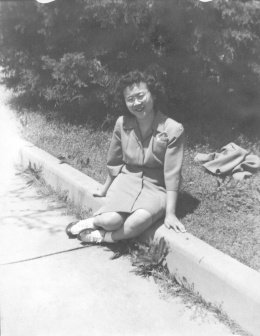 Media
Media
